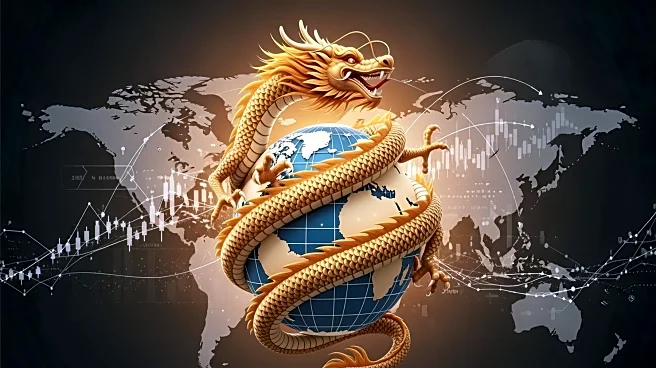What's Happening?
China's economy has reported a slowdown in growth, expanding at an annual rate of 4.8% during the July-September period, marking the slowest pace in a year. This deceleration is attributed to ongoing trade
tensions with the United States and weakened domestic demand. The growth rate is a decline from the 5.2% recorded in the previous quarter. Despite higher tariffs imposed by President Trump on Chinese imports, China's exports have remained relatively strong as businesses have redirected their sales to other global markets. The economic slowdown is further compounded by a prolonged downturn in the property sector, which has negatively impacted consumption and demand. The Chinese government is convening a significant political meeting to outline economic and social policy goals for the next five years.
Why It's Important?
The slowdown in China's economic growth has significant implications for global markets, particularly the United States, which is engaged in ongoing trade disputes with China. The tariffs imposed by President Trump are part of a broader strategy to address trade imbalances, but they also contribute to economic uncertainty. The property sector's downturn in China could lead to reduced demand for U.S. exports, affecting American businesses reliant on Chinese markets. Additionally, the economic challenges faced by China may prompt further policy measures to stimulate growth, potentially influencing global economic trends. The situation underscores the interconnectedness of the U.S. and Chinese economies and the broader impact of geopolitical tensions on economic stability.
What's Next?
Economists anticipate potential policy responses from the Chinese government, including possible rate cuts by China's central bank to encourage spending and investment. The upcoming political meeting in China may result in new measures aimed at supporting consumption and the property market. The outcome of these discussions could influence future trade negotiations between the U.S. and China, particularly if President Trump and Chinese leader Xi Jinping proceed with a proposed meeting during a regional summit. The global economic community will be closely monitoring these developments, as they could have far-reaching effects on international trade and economic growth.
Beyond the Headlines
The economic slowdown in China highlights deeper issues within the country's economic structure, including overcapacity in certain sectors and the need for sustainable growth strategies. The situation raises questions about the long-term viability of China's economic model and its ability to adapt to changing global conditions. The trade tensions with the U.S. also reflect broader geopolitical dynamics, with potential implications for international relations and economic policies. As China navigates these challenges, the global community must consider the ethical and strategic dimensions of economic interdependence and the pursuit of equitable growth.










